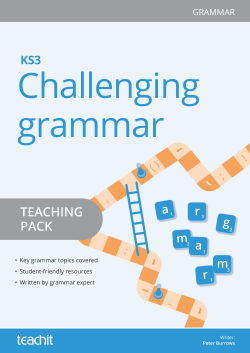Challenging grammar
Addressing the most challenging grammar topics introduced at KS2 and revisited at KS3, this pack is essential for teaching and consolidating grammar in years 5-8.
The comprehensive teaching notes provide a valuable curriculum support for teachers, while the wide range of resources and activities ensures that students have high-quality opportunities to apply and extend their learning – including in cross-curricular contexts. Each topic also includes KS2 SAT style questions in preparation for the Grammar, Punctuation and Spelling test (Paper 1) at the end of year 6.
What's included?
The grammar topics are organised into three sections (teach, practise, apply), and each topic includes the following:
- definitions and explanations for teachers
- PowerPoint presentations
- student-friendly teaching resources
- extended writing opportunities.
The pack is organised in the following topics:
- Relative clauses
- Modal verbs and adverbs
- Adverbials
- Perfect forms of verbs
- Parenthesis
- Commas
- Passive verbs
- Subjunctive verb forms
- Colons and semi-colons
What's inside?
Introduction (pages 4-6)
Relative clauses (pages 7-33)
- Resource - people, places and things
- Resource - improve by adding a relative clause
- Resource - possessive relative clauses
- Resource - relative clauses of time and place (when and where)
- Resource - the unusual suspects
Modal verbs and adverbs (pages 34-50)
- Resource - strengthening and weakening
- Resource - school rules
- Resource - be the detective
Adverbial phrases (pages 51-71)
- Resource - identify adverbials
- Resource - painting a picture
- Resource - narrative
Perfect forms (pages 72-95)
- Resource - find the perfect verb form
- Resource - perfect verb forms in texts
- Resource - time-travelling verbs
- Resource - perfect verb form timeline
- Resource - job application
- Resource - my day
- Resource - perfect form dice
- Resource - 'of' or 'have'
Parenthesis (pages 96-115)
- Resource - using brackets to indicate parenthesis
- Resource - using commas to indicate parenthesis
- Resource - extending simple sentences using parenthesis
- Resource - nicknames as parenthesis
Commas (pages 116-140)
- Resource - the Oxford comma
- Resource - add the comma
- Resource - combining sentences
- Resource - ambiguous meaning
Passive verbs (pages 141-165)
- Resource - rainbow writing
- Resource - conversion
- Resource - food chains
- Resource - snakes and ladders
- Resource - don't blame me!
Subjunctive verb forms (pages 166-185)
- Resource - identify the infinitive
- Resource - subjunctive poem
- Resource - subjunctive sentences
- Resource - subjunctive speeches
Colons and semi-colons (pages 186-199)
- Resource - spot the colons and semi-colons
- Resource - combining clauses
- Resource - using colons and semi-colons
- Resource - semi-colon poetry
This is a sample student activity on relative clauses:
Relative clauses of time and place (when and where)
Rewrite the simple sentences below by inserting a relative clause. The relative clause must begin with either ‘when’ or ‘where’.
| Simple Sentence | Sentence with relative clause |
| The forest was dark. | |
| Last week Charlie fell over. | |
| On 22nd May, the rocket will launch. | |
| The castle glittered in the sunset. | |
| Christmas Day is my favourite day in the whole year. | |
| London is a big city. |
All reviews
Have you used this resource?
Review this resource12/07/2017
09/03/2017
08/02/2017
15/01/2017
06/01/2017
29/10/2016
12/09/2016
31/08/2016
28/08/2016
Whatever you end up studying in KS 3 can only be made easier by having a logical understanding of sentence structure (verbs, nouns, s. and pl. pronouns gender and therefore adjectival agreement)
This is why English and French teachers at primary school should be working together, but does this ever happen?
I have looked at the materials provided and think this will be a great teaching aid, because the learning steps are clearly set out and don't intimidate the learner by using grammatical terms
without a full and user-friendly explanation.
20/08/2016

